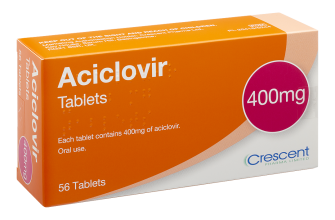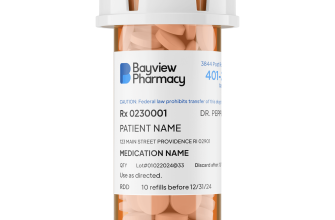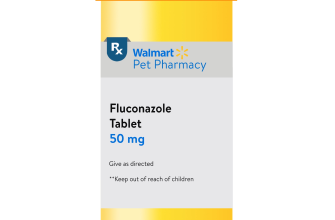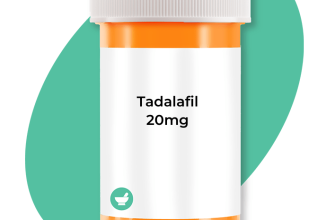Consider obtaining Plavix only through licensed pharmacies. While some may seek alternatives to bypass prescription requirements, this approach can expose one to significant health risks. A consultation with a healthcare provider ensures that you receive appropriate medical advice tailored to your unique health needs.
Plavix, known generically as clopidogrel, is often prescribed to prevent blood clots in patients with various cardiovascular conditions. Understanding the potential side effects, interactions with other medications, and monitoring requirements is essential for safe use. Without professional guidance, one may overlook these critical factors.
If access to traditional healthcare is challenging, explore legitimate online consultation services. Many providers offer assessments that can lead to prescriptions when necessary. This approach allows you to obtain the medication responsibly while ensuring your health and safety are prioritized.
Make informed decisions and prioritize your well-being. Always consider the implications of self-medicating, and seek professional assistance when it comes to medications like Plavix.
- Plavix Without Prescription
- Understanding Plavix: Uses and Benefits
- Key Uses of Plavix
- Benefits of Plavix
- Legal Status of Plavix: Prescription Requirements
- Prescription Regulations
- Alternatives to Prescription
- Risks of Using Plavix Without a Prescription
- Potential Drug Interactions
- Underlying Health Conditions
- Alternatives to Obtaining Plavix Legally
- How to Approach a Healthcare Provider for Plavix
- Prepare Your Medical History
- Express Your Concerns and Goals
- Dosage and Administration Guidelines for Plavix
- Administration Tips
- Special Populations
- Possible Side Effects of Plavix: What to Watch For
- Resources and Support for Patients Seeking Plavix
- Online Pharmacy Directories
- Patient Advocacy Groups
Plavix Without Prescription
Plavix is a medication used to prevent blood clots, commonly prescribed after heart attacks or strokes. Obtaining Plavix without a prescription is illegal in many places, and the risks associated with self-medication can be significant.
Consider the following recommendations:
- Consult a Healthcare Professional: Always seek advice from a doctor or pharmacist before starting Plavix, as it may interact with other medications.
- Evaluate Your Health Status: Conditions like bleeding disorders or recent surgeries can affect the suitability of Plavix.
- Consider Alternatives: If obtaining a prescription proves challenging, discuss alternative medications with your healthcare provider.
Many online pharmacies claim to sell Plavix without a prescription. Exercise caution; these sites may not be regulated, leading to potential safety issues. Verify the pharmacy’s credentials through national pharmacy boards.
Self-prescribing Plavix may lead to severe complications, including uncontrolled bleeding, heart issues, or adverse reactions. It’s unwise to make such critical health decisions without professional guidance.
Responsible management of your health should always involve a licensed professional. Prioritize safety by following the appropriate channels to obtain Plavix legally and safely.
Understanding Plavix: Uses and Benefits
Plavix, or clopidogrel, serves as an antiplatelet medication that reduces the risk of blood clots. It plays a significant role in preventing heart attacks and strokes in individuals with cardiovascular disease. By inhibiting platelet aggregation, Plavix ensures better blood flow, especially after surgeries like angioplasty or the placement of a stent.
Key Uses of Plavix
This medication is commonly prescribed for various conditions, including:
- Coronary artery disease (CAD)
- Peripheral artery disease
- Acute coronary syndrome
- After certain types of heart surgery, such as coronary artery bypass grafting (CABG)
Benefits of Plavix
Plavix offers several advantages:
| Benefit | Description |
|---|---|
| Reduces Clot Formation | Inhibits platelets, preventing dangerous clots. |
| Post-Surgery Protection | Decreases chances of complications following heart procedures. |
| Long-Term Use | Can be taken for extended periods to maintain cardiovascular health. |
| Minimal Dietary Restrictions | No major restrictions, allowing flexibility in diet. |
Consult your healthcare provider for personalized advice regarding Plavix. This medication requires careful consideration to maximize its benefits while minimizing risks.
Legal Status of Plavix: Prescription Requirements
Plavix is classified as a prescription medication in many countries, including the United States. Obtaining Plavix without a prescription can lead to legal repercussions and health risks. Always consult with a healthcare professional who can evaluate your medical history and determine if Plavix is appropriate for you.
Prescription Regulations
In the United States, Plavix is regulated by the Food and Drug Administration (FDA). It is approved for use in patients at risk of heart attack or stroke. A doctor will assess factors like your health status and potential drug interactions before issuing a prescription. The prescription requirement helps ensure patient safety and proper use of the medication.
Alternatives to Prescription
If you are looking for alternatives to Plavix without a prescription, several over-the-counter medications and lifestyle changes can support cardiovascular health. Always discuss these options with a healthcare provider to avoid any negative effects.
| Country | Prescription Requirement |
|---|---|
| United States | Required |
| Canada | Required |
| European Union | Required |
| Australia | Required |
Always prioritize safety and legal guidelines when considering any medication. Consulting a doctor before making healthcare decisions is crucial.
Risks of Using Plavix Without a Prescription
Using Plavix without a prescription can significantly increase health risks. One major concern is improper dosage. Without professional guidance, individuals may take too little or too much, leading to inadequate protection against blood clots or an increased risk of bleeding complications.
Potential Drug Interactions
Plavix can interact dangerously with various medications, including certain antidepressants and antacids. Without a prescription, users are unlikely to receive information about these interactions, heightening the risk of adverse effects.
Underlying Health Conditions
Individuals with specific health issues, like liver disease or recent surgery, may be unsuitable candidates for Plavix. Using it without medical advice can exacerbate existing conditions or lead to severe complications. Consulting a healthcare provider ensures that the medication is appropriate and safe for your health profile.
Alternatives to Obtaining Plavix Legally
If you’re seeking alternatives to legally obtaining Plavix, consider asking your healthcare provider for alternatives such as generic medications. Generic versions of clopidogrel can provide similar benefits at a lower cost.
Exploring patient assistance programs offered by pharmaceutical companies may also be beneficial. Many companies have initiatives designed to help eligible patients receive medications at little or no cost.
Consulting local pharmacies can yield options for discount programs or coupons that reduce the price of Plavix. Some pharmacies offer loyalty plans that may lower costs for repeat prescriptions.
Researching community health clinics in your area may uncover additional resources. These clinics often provide medical services and can assist in obtaining necessary medications affordably.
Online pharmaceutical services sometimes offer consultations with licensed healthcare professionals who can prescribe Plavix after evaluating your health needs. Ensure these services are legitimate and adhere to safety regulations.
Consider discussing with your doctor the possibility of switching to a different anticoagulant that may be more accessible or affordable. Your doctor can help you understand the benefits and risks associated with any alternative medication.
Lastly, check if your health insurance plan covers Plavix or alternative medications. Understanding your coverage can help you make informed decisions regarding your prescription needs.
How to Approach a Healthcare Provider for Plavix
Be clear about why you need Plavix. Describe any symptoms or risk factors that led you to consider this medication. For example, mention if you’ve experienced specific cardiovascular issues or if a recent medical evaluation suggested it might be helpful for your condition.
Prepare Your Medical History
Gather your medical history, including:
- Current medications and dosages
- Previous diagnoses related to heart health
- Allergies and adverse reactions to medications
Having this information ready helps the provider assess your situation more accurately.
Express Your Concerns and Goals
Clearly communicate your health goals. If your aim is to reduce the risk of heart attacks or strokes, say so. Also, bring up any concerns regarding potential side effects or interactions with existing medications. Engaging in an open dialogue fosters trust and collaboration.
Ask specific questions about the potential benefits and risks of Plavix. Understanding how it impacts your unique health situation allows for informed decision-making.
Consider discussing alternative treatments as well. This shows that you are proactive in managing your health and open to exploring different options.
Dosage and Administration Guidelines for Plavix
The recommended dosage for Plavix is typically 75 mg once daily. For individuals with certain conditions or those undergoing specific medical procedures, an initial loading dose of 300 mg may be prescribed. This loading dose is often critical for achieving adequate blood thinning in a short period, particularly in acute situations such as after a heart attack or stent placement.
Administration Tips
Take Plavix with or without food, ensuring consistent timing each day to maintain steady levels in your bloodstream. Swallow the tablet whole. Avoid crushing or splitting it, as this can affect how the drug works.
Special Populations
For patients with liver impairment, adjustments to the dosage may be necessary. Close monitoring by a healthcare provider is advised in these cases. If taking other medications, consult with a healthcare professional to avoid potential interactions, as some drugs may increase the risk of bleeding when taken alongside Plavix.
Possible Side Effects of Plavix: What to Watch For
Monitor for unusual bruising or bleeding, which can occur due to Plavix’s blood-thinning properties. If you notice prolonged bleeding from cuts or increased bleeding during dental work, consult a healthcare professional.
Watch for gastrointestinal issues, particularly stomach pain, heartburn, or signs of ulcers such as black or bloody stools. Severe abdominal pain may require immediate medical attention.
Be alert for signs of liver problems, such as jaundice, which manifests as yellowing of the skin or eyes, dark urine, or severe fatigue. Report these symptoms to your doctor promptly.
Headaches can arise from Plavix use. If headaches become severe or persist, seek advice from your healthcare provider on management options.
In rare cases, Plavix may trigger allergic reactions, evidenced by rash, itching, or difficulty in breathing. If these symptoms appear, seek immediate medical help.
Finally, fatigue or weakness can be side effects. If you experience significant changes in your energy levels, talk to your doctor to rule out underlying concerns.
Resources and Support for Patients Seeking Plavix
If you are considering obtaining Plavix, start by checking accessible resources that provide information on this medication. You can consult the official websites of health organizations, such as the American Heart Association or the Centers for Disease Control and Prevention (CDC). They offer guidelines and educational materials about blood thinners and heart health.
Online Pharmacy Directories
Use verified online pharmacy directories to ensure safety and compliance. Websites like the National Association of Boards of Pharmacy (NABP) can help you find legitimate online pharmacies that may not require a prescription for Plavix if state laws permit.
Patient Advocacy Groups
Engage with patient advocacy groups focused on heart health and blood disorders. Organizations such as the National Blood Clot Alliance (NBCA) and the American Heart Association often provide resources, support networks, and information on accessing medications. They can connect you with experts who can answer your questions.
- Contact local healthcare providers or clinics for advice.
- Join online forums or support groups related to cardiovascular health.
- Consider telehealth options for consultations, as many providers now offer virtual visits.
Staying informed and connected with supportive communities enhances your understanding and access to Plavix. Always prioritize your health and seek assistance from reliable sources when needed.










